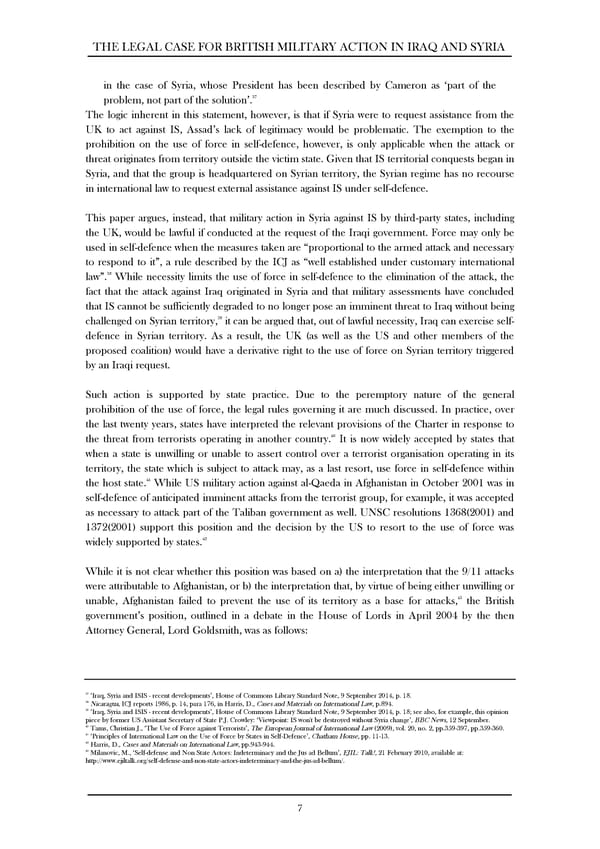THE LEGAL CASE FOR BRITISH MILITARY ACTION IN IRAQ AND SYRIA in the case of Syria, whose President has been described by Cameron as ‘part of the 37 problem, not part of the solution’. The logic inherent in this statement, however, is that if Syria were to request assistance from the UK to act against IS, Assad’s lack of legitimacy would be problematic. The exemption to the prohibition on the use of force in self-defence, however, is only applicable when the attack or threat originates from territory outside the victim state. Given that IS territorial conquests began in Syria, and that the group is headquartered on Syrian territory, the Syrian regime has no recourse in international law to request external assistance against IS under self-defence. This paper argues, instead, that military action in Syria against IS by third-party states, including the UK, would be lawful if conducted at the request of the Iraqi government. Force may only be used in self-defence when the measures taken are “proportional to the armed attack and necessary to respond to it”, a rule described by the ICJ as “well established under customary international 38 law”. While necessity limits the use of force in self-defence to the elimination of the attack, the fact that the attack against Iraq originated in Syria and that military assessments have concluded that IS cannot be sufficiently degraded to no longer pose an imminent threat to Iraq without being challenged on Syrian territory,39 it can be argued that, out of lawful necessity, Iraq can exercise self- defence in Syrian territory. As a result, the UK (as well as the US and other members of the proposed coalition) would have a derivative right to the use of force on Syrian territory triggered by an Iraqi request. Such action is supported by state practice. Due to the peremptory nature of the general prohibition of the use of force, the legal rules governing it are much discussed. In practice, over the last twenty years, states have interpreted the relevant provisions of the Charter in response to 40 the threat from terrorists operating in another country. It is now widely accepted by states that when a state is unwilling or unable to assert control over a terrorist organisation operating in its territory, the state which is subject to attack may, as a last resort, use force in self-defence within the host state.41 While US military action against al-Qaeda in Afghanistan in October 2001 was in self-defence of anticipated imminent attacks from the terrorist group, for example, it was accepted as necessary to attack part of the Taliban government as well. UNSC resolutions 1368(2001) and 1372(2001) support this position and the decision by the US to resort to the use of force was widely supported by states.42 While it is not clear whether this position was based on a) the interpretation that the 9/11 attacks were attributable to Afghanistan, or b) the interpretation that, by virtue of being either unwilling or 43 unable, Afghanistan failed to prevent the use of its territory as a base for attacks, the British government’s position, outlined in a debate in the House of Lords in April 2004 by the then Attorney General, Lord Goldsmith, was as follows: 37 ‘Iraq, Syria and ISIS - recent developments’, House of Commons Library Standard Note, 9 September 2014, p. 18. 38 Nicaragua, ICJ reports 1986, p. 14, para 176, in Harris, D., Cases and Materials on International Law, p.894. 39 ‘Iraq, Syria and ISIS - recent developments’, House of Commons Library Standard Note, 9 September 2014, p. 18; see also, for example, this opinion piece by former US Assistant Secretary of State P.J. Crowley: ‘Viewpoint: IS won't be destroyed without Syria change’, BBC News, 12 September. 40 Tams, Christian J., ‘The Use of Force against Terrorists’, The European Journal of International Law (2009), vol. 20, no. 2, pp.359-397, pp.359-360. 41 ‘Principles of International Law on the Use of Force by States in Self-Defence’, Chatham House, pp. 11-13. 42 Harris, D., Cases and Materials on International Law, pp.943-944. 43 Milanovic, M., ‘Self-defense and Non State Actors: Indeterminacy and the Jus ad Bellum’, EJIL: Talk!, 21 February 2010, available at: http://www.ejiltalk.org/self-defense-and-non-state-actors-indeterminacy-and-the-jus-ad-bellum/. 7
 The legal case for action Page 6 Page 8
The legal case for action Page 6 Page 8